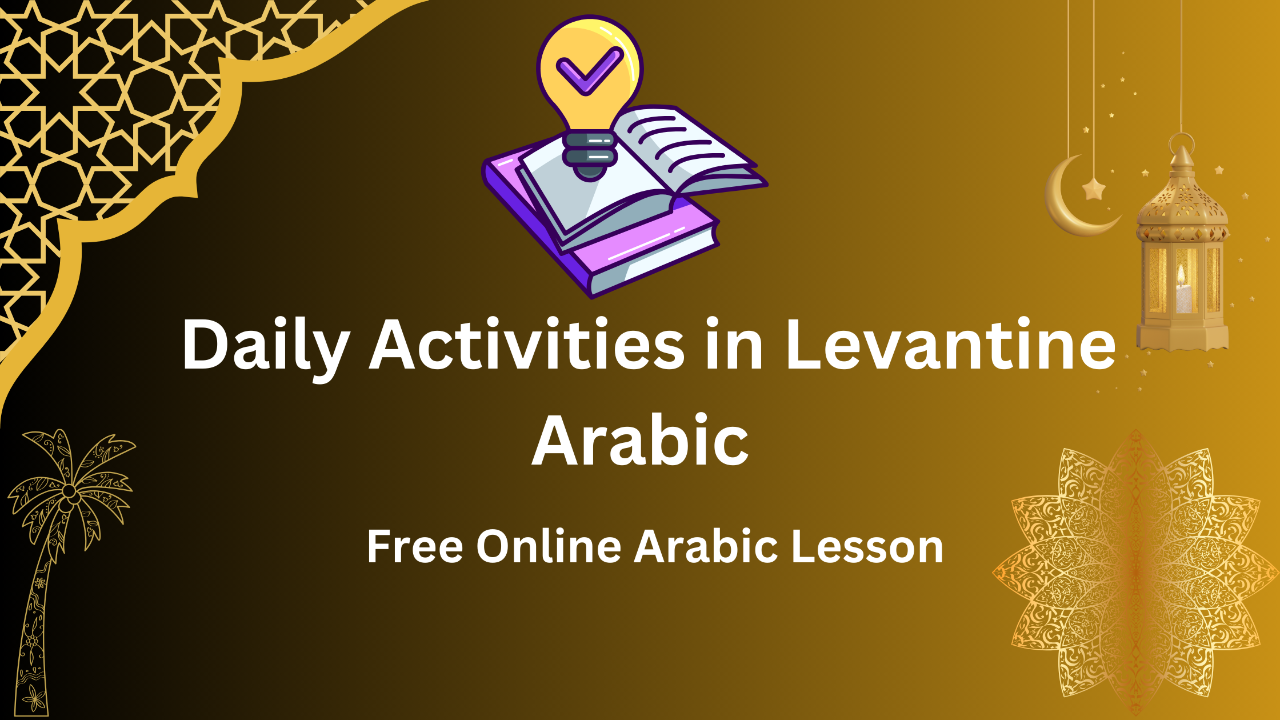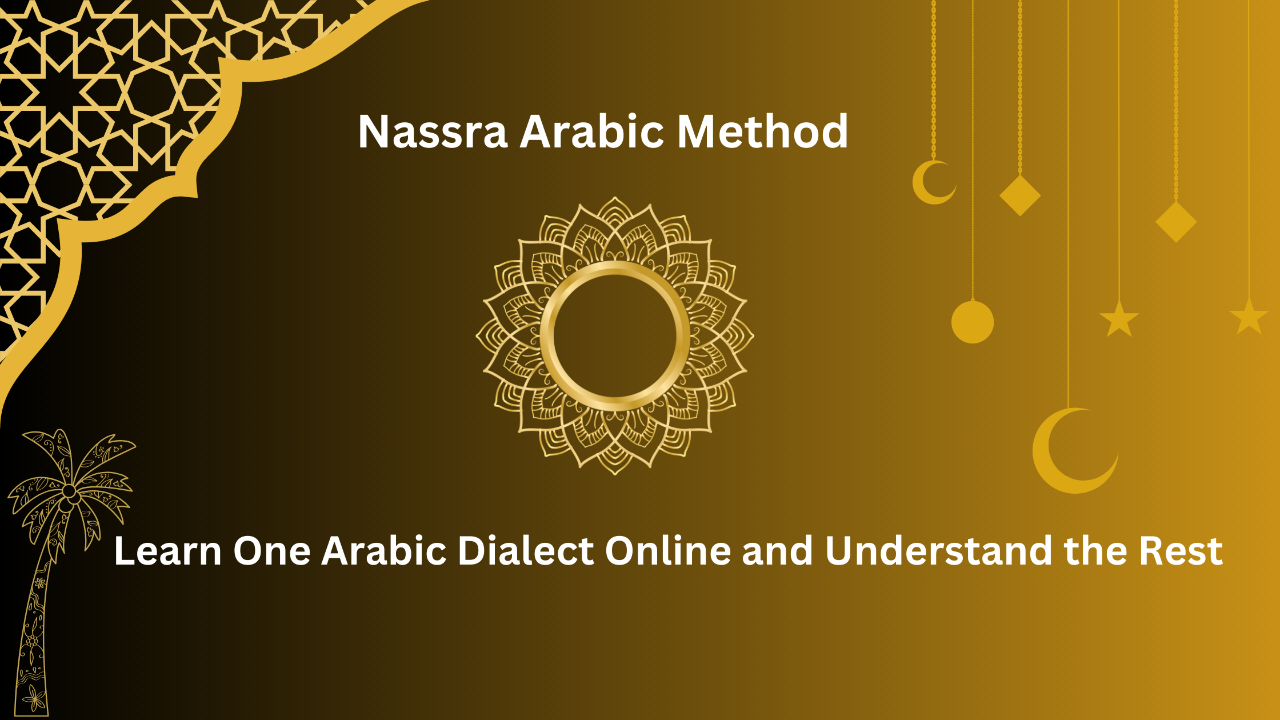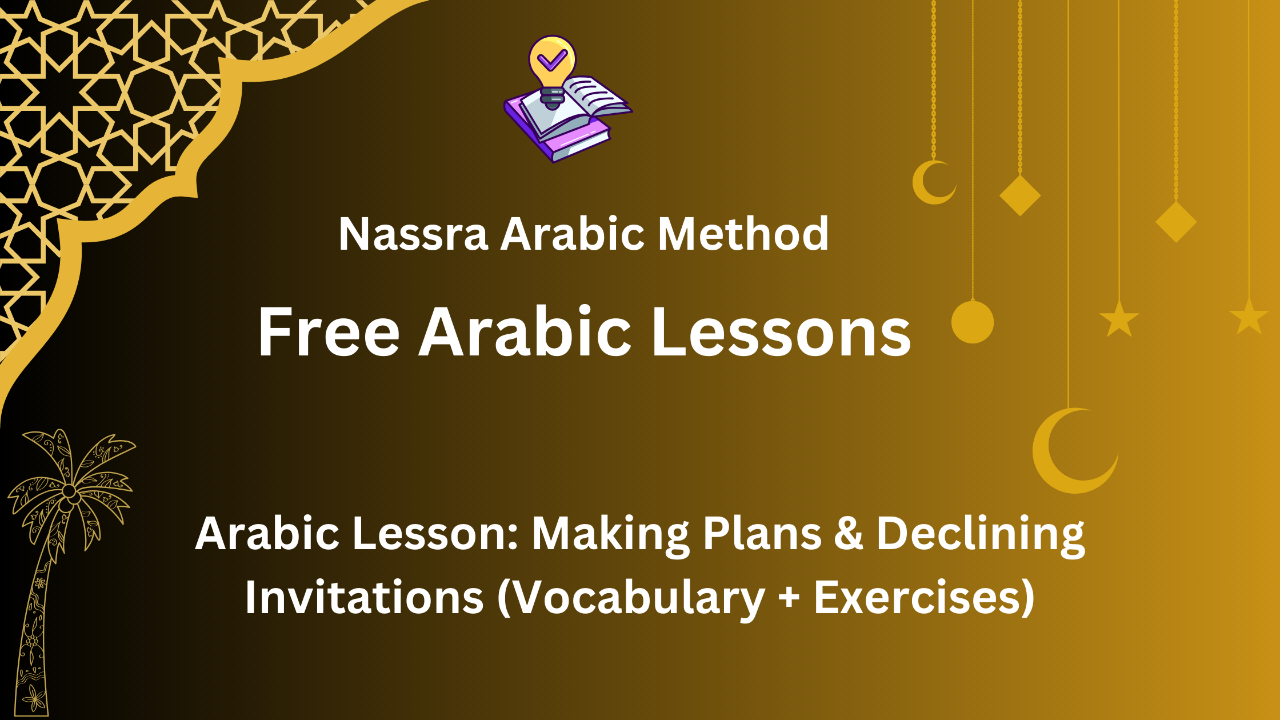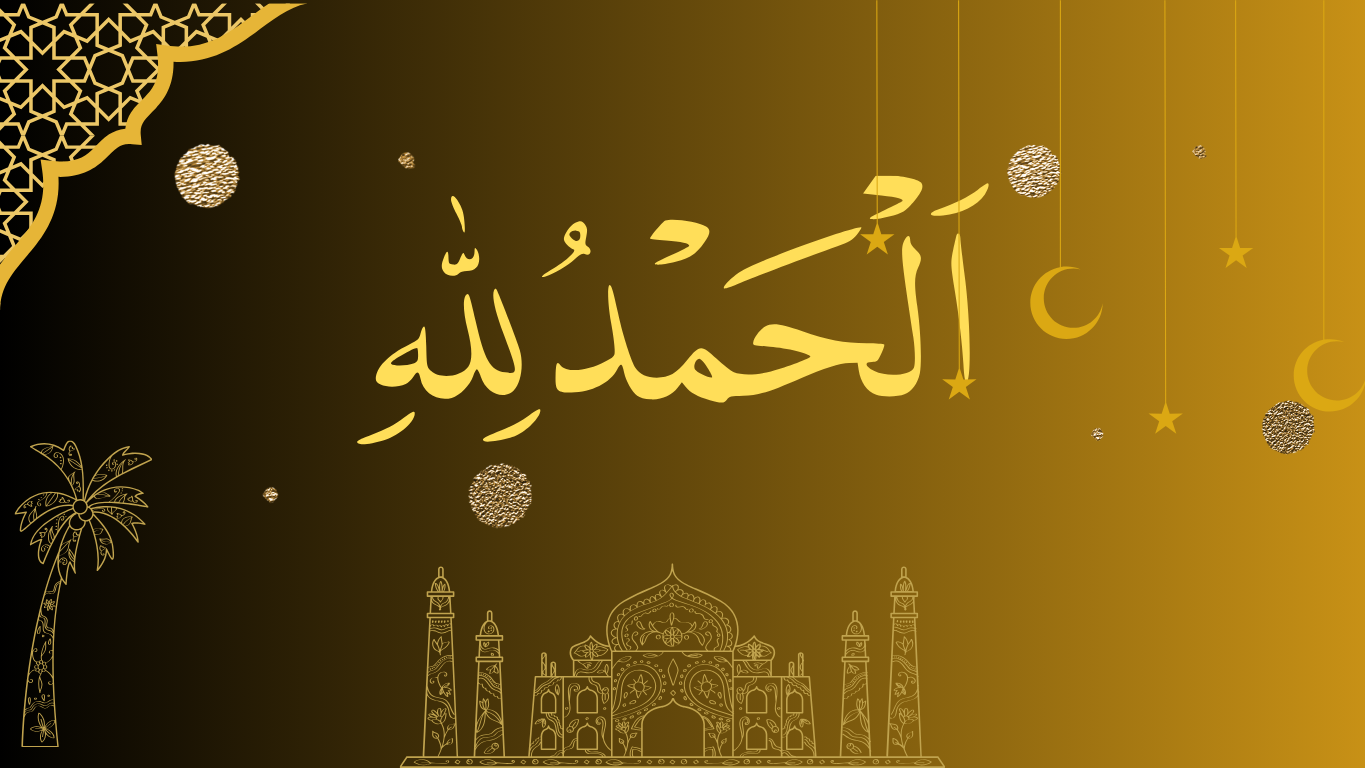Learn Arabic Online Free
With Nassra Arabic Online Course App.
Learn Arabic online with free resources such as Arabic audio and video lessons, podcasts, and helpful tips to master the Arabic language. Perfect for beginners or those looking to sharpen their Arabic learning skills.
Free Online Arabic Lesson - Daily Activities in Levantine Arabic

Introduction
Welcome to this exciting lesson on expressing your daily routine in Levantine Arabic! Whether you're a beginner or looking to brush up your skills, this lesson will teach you how to talk about your day—from morning breakfast to evening relaxation—using a natural and relatable dialogue. By the end, you’ll be ready to chat about your own activities with confidence. Let’s get started!
Dialogue
Below is the dialogue you provided, presented in Arabic, with transliteration and English translation for easy learning:
Arabic
شُو بِدَّك تْسَاوي؟
اليُوم بِدِّي سَاوي كْتير إِشْيَا أَوَّل شِي بِدِّي آَكُل فْطُورِي وَ بَعْدِين بِدِّي رُوح عَ الشِّغِل وَ بِدِّي ضَل حَتَّى السَّاعَه تِنْتين وَ بَعْدين بِدِّي رُوح مَع رِفْقَاتِي عَ المَطْعم وَ بِدِّي آَكُل أَكِل عَرَبي وَ بَعْدِين بِدِّي رُوح عَ البِيت و نَام وَ بَعْدِين بِدِّي شُوف مُسَلْسَل وَ إِحْكي مَع أَحْمَد
Transliteration
Shu biddak tsaawi?
Alyoom biddi saawi kteer ishya. Awwal shi biddi akul ftoori wa ba3deen biddi
...Learn Arabic Online : Rosetta stone vs Nassra Arabic Method

Rosetta Stone vs. Nassra Arabic Method: Which Is Best for Learning Modern Standard Arabic Online?
Learning Modern Standard Arabic (MSA) is a powerful step toward mastering the formal language of the Arab world. As the official language of over 20 countries, MSA is used in media, literature, formal speeches, and written communication. Whether you’re aiming to understand Arabic news or engage in professional settings, choosing the right learning tool is key. Two standout options are Rosetta Stone and the Nassra Arabic Method. In this comparison, we’ll explore how each helps you learn Arabic online, with a spotlight on why the Nassra Arabic Method offers a unique edge.
Why Learn Modern Standard Arabic (MSA)?
MSA is more than just a language—it’s a bridge to the Arab world:
- Formal Communication: It’s the standard for news, books, and official documents.
- Cultural Insight: MSA unlocks access to Arabic literature and heritage..
Let’s dive into how Rosetta Stone and the Nassra Arab...
Learn One Arabic Dialect Online and Understand the Rest: Your Shortcut to Fluency

Learn One Arabic Dialect Online and Understand the Rest perfectly
Imagine unlocking the vibrant world of Arabic with just one key. Did you know that Arabic has 3 main standard dialects, but mastering a single one—like Levantine, Gulf, or Egyptian—can help you understand many others? If you’re eager to learn Arabic, focusing on one dialect isn’t just practical—it’s a proven strategy to fast-track your fluency across the Arab world. Let’s dive into why this works, how to pick the right dialect, and the best ways to get started online. By the end, you’ll be convinced to take action today!
Why Mastering One Dialect Unlocks the Rest
Arabic dialects might sound diverse, but they’re more connected than you think. A University of Cambridge study revealed that learners who master one dialect can pick up others with surprising ease. Here’s why this approach is a game-changer:
- Shared Roots: Levantine, Gulf, and Egyptian dialects overlap in grammar and vocabulary. For instance, "than ...
Free Arabic Lesson : Making Plans & Declining Invitations (Vocabulary + Exercises)

Free Arabic Lesson: Mastering Levantine Arabic Through Everyday Conversations
Welcome to this exciting Levantine Arabic lesson! Today, you’ll step into a real-life conversation between Sarah and Rami as they try to make plans. This lesson will help you learn practical vocabulary, improve your pronunciation, and practice with engaging exercises. Whether you’re new to Arabic or looking to sharpen your skills, this lesson is perfect for you. Let’s dive in and explore the vibrant world of Levantine Arabic, spoken across Lebanon, Syria, Jordan, and Palestine!
Arabic Level: Beginner/Intermediate
The Arabic Dialogue
Here’s the full dialogue in Arabic, with its transliteration and English translation to guide you:
Arabic:
ساره: شُو رَأيَك نْرُوح عَ النَّادِي الأَرْبَعَا الجَاي؟ صَرْلي زَمَان مَا رِحِت
رَامِي: آَسِف الأَرْبَعَا الجَاي أَنا مَشْغُول كْتِير
ساره: طَيِّب. رْفيقْتِي رَنا عَامْلِه حَفْلِه الجِمْعَه الجَاي. يَلَّا نْرُوح سَوَى
رَامِي: عَن جَد أَنا آَسِف. يُوم الجُمْعَ...
Al Madina Arabic vs. Nassra Arabic Online Method: Best Way to Learn Arabic

Al Madina Arabic vs. Nassra Arabic Online Method: Which Is Best for Your Arabic Learning Goals?
Learning Arabic opens doors to a vibrant culture, rich history, and over 400 million native speakers across 22 countries. But with so many approaches—formal Arabic, spoken dialects, or Quranic recitation—where do you start? Two standout online platforms, Al Madina Arabic and Nassra Arabic Online Method, cater to different needs. Whether you want to master the Quran, chat with locals in Dubai, or read Arabic news, this guide compares both methods to help you choose.
Let’s explore what each offers, how they differ, and which one fits your goals—all while sprinkling in tips, facts, and resources to fuel your Arabic journey!
Why Learn Arabic?
Arabic isn’t just a language—it’s a global powerhouse, ranked as the 5th most spoken language worldwide. It’s your key to understanding the Quran, connecting with Arab communities, or tapping into Middle Eastern business opportunities. Arabic comes
...Learning the Arabic Alphabet: Your Gateway to Fluency in Dialects and Modern Standard Arabic

Learning the Arabic Alphabet: Your Gateway to Fluency in Arabic
Imagine strolling through a vibrant market in Cairo or Beirut, the air buzzing with voices, the signs bursting with colorful script. You want to order a steaming plate of shawarma or ask for directions—but the letters on the menus and street signs look like elegant, indecipherable squiggles. Sound familiar? That’s where the Arabic alphabet swoops in to save the day. It’s not just a collection of 28 letters; it’s your key to unlocking fluency in both Modern Standard Arabic (MSA) and the lively dialects spoken across the Arab world. Whether you dream of chatting with locals in Moroccan Darija or reading a classic Arabic novel, mastering the alphabet is your essential first step.
In this guide, we’ll dive into why the Arabic alphabet is a must-learn, break down its quirks, and arm you with practical tips, fun facts, and free resources to make the journey engaging and effective. Let’s transform those mysterious squiggles i
...Is Modern Standard Arabic Used In Everyday Conversation?

Modern Standard Arabic
Have you ever wondered if Modern Standard Arabic (MSA) is the language you’d hear in bustling markets or cozy coffee shops across the Arab world? If you’re learning Arabic—or just curious about how it’s spoken—this question is a big one. In this blog, we’ll explore whether MSA is used in everyday conversation, backed by clear facts and examples, and optimized for anyone searching for answers. Let’s dive into the world of Arabic!
What Is Modern Standard Arabic (MSA)?
Modern Standard Arabic (MSA) is the standardized, formal version of Arabic understood across the 22 Arab countries. It’s rooted in Classical Arabic—the language of the Quran—but adapted for modern times. MSA is the “official” language you’ll encounter in:
- News broadcasts (think Al Jazeera or BBC Arabic)
- Books, newspapers, and academic papers
- Formal speeches (like those at conferences or in parliaments)
- Education (textbooks and classroom instruction)
It’s the bridge that connects Arabic
...
Why Do 95% of Arabic Learners Quit Within 3 Months?

Why Do 95% of Arabic Learners Quit Within 3 Months? Here’s How to Beat the Odds
Learning Arabic is a dream for many, but a staggering 95% of learners abandon it within the first three months. Why does this happen, and how can you avoid being part of that statistic? The answer lies in the disconnect between traditional teaching methods and what learners actually need to succeed. In this blog, we’ll uncover the reasons behind this dropout rate, backed by facts, and share practical solutions to keep you motivated and on track. Plus, we’ll spotlight free resources like the Nassra Arabic Method YouTube channel to guide your journey. Let’s dive into why Arabic feels so tough—and how to make it work for you.
The Root of the Problem: Why Learners Quit Arabic Early
Arabic’s reputation as a challenging language isn’t just hype—it’s rooted in real obstacles. Here’s why most learners give up:
1. The MSA vs. Dialect Divide
- What’s Taught: Most courses, YouTube channels, and classrooms ...
Why Arabic is Consider A Hard Language To Learn

Why Arabic Feels Like a Mountain to Climb—and How We Make It a Joyride
Arabic has a notorious reputation as one of the trickiest languages for English speakers to learn. If you’ve ever tried tackling it and found yourself drowning in grammar rules or lost in a sea of unfamiliar letters, you’re not alone. The frustration isn’t just in your head—it’s baked into how Arabic is often taught. Too many programs focus on dusty textbooks and Classical Arabic, leaving you unprepared for real conversations and disconnected from the vibrant culture behind the language.
At our language academy, we’ve heard these struggles loud and clear. We’ve ditched the old-school playbook and created a fresh, practical way to learn Arabic that’s as enjoyable as it is effective. Let’s break down why Arabic feels so hard—and how we turn those challenges into opportunities.
What Makes Arabic So Tough?
Arabic isn’t inherently impossible, but it does throw some unique curveballs at learners. Here’s why it
...3 Ways to Say “How Are You?” in Arabic (With Cultural Tips!)

3 Ways to Say “How Are You?” in Arabic (With Cultural Tips!)
Learning basic greetings is the first step to connecting with Arabic speakers. Whether you’re traveling to the Middle East, practicing with friends, or exploring the language, knowing how to ask “How are you?” in Arabic opens doors to warm conversations. Below are three common ways to ask this question, along with pronunciation guides, cultural insights, and example responses.
1. كَيْفَ حَالُكَ؟ (Kayfa Ḥāluka?) – Formal/Standard Arabic
Pronunciation: KAY-fa HA-loo-ka?
Literal Meaning: “How is your condition?”
Usage:
-
This is the most universal phrase in Modern Standard Arabic (MSA), understood across all Arab countries.
-
Use it in formal settings, with strangers, or in writing (like emails).
Response: -
أَنَا بِخَيْر، شُكْرًا! (Ana bi-khayr, shukran!) – “I’m fine, thank you!”
-
الحَمْدُ لِلَّهِ (Al-ḥamdu lillāh) – “Praise God” (a common, humble reply).
Cultural Tip:
In Arabic culture, asking about some...




